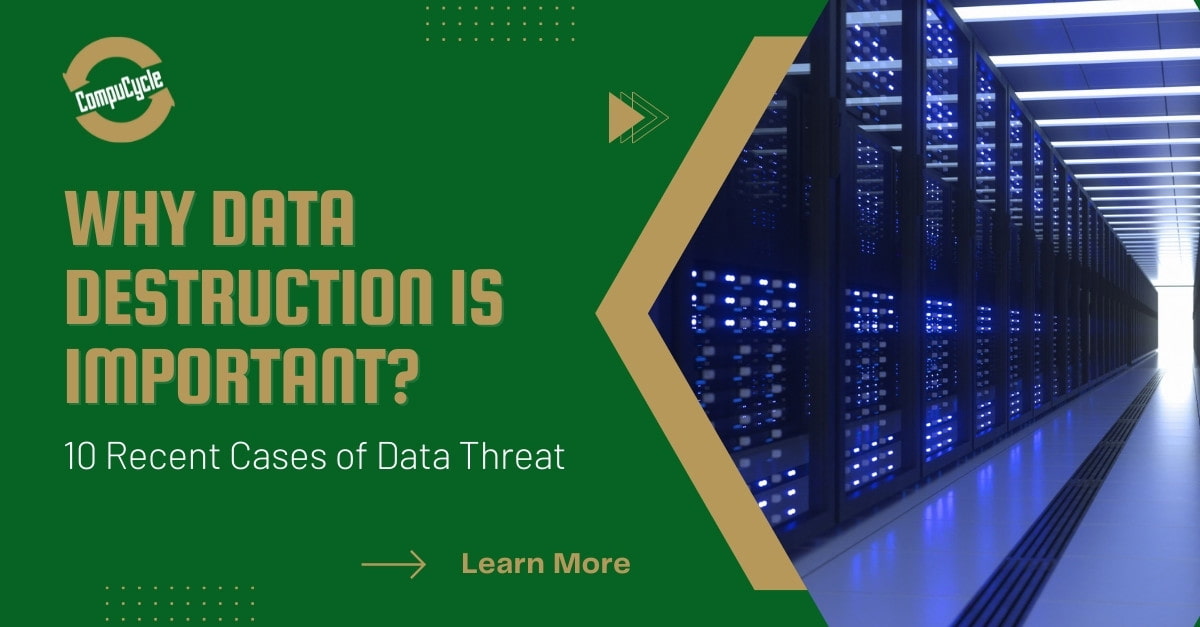The Value of Effective Data Destruction Practices in Safeguarding Sensitive Information and Ensuring Computer Protection
In a period where data breaches are significantly common, the importance of efficient data devastation methods can not be overemphasized. Carrying out robust information destruction approaches not only minimizes these dangers yet likewise straightens with legal compliance demands, ensuring that companies support their reputation and foster client trust.
Recognizing Data Devastation
Comprehending information damage is crucial in today's electronic landscape, where sensitive details can quickly be jeopardized. Reliable data devastation includes not just making certain but erasing documents that data is irretrievable with extensive techniques. This procedure is important for companies that take care of confidential client info, copyright, or inner documents, as any breach can cause extreme financial and reputational consequences.
Data damage incorporates numerous strategies, including shredding physical media, degaussing magnetic storage devices, and employing software-based services that overwrite data several times. Each technique offers a certain objective and has to straighten with the level of sensitivity of the details being dealt with. As an example, physical damage is commonly favored for hard disks having very personal information, while software program approaches could be adequate for much less delicate info.
Furthermore, adhering to industry standards and laws, such as the General Data Security Policy (GDPR) or the Health Insurance Transportability and Responsibility Act (HIPAA), is imperative for conformity and to reduce legal threats. Organizations should develop a durable data destruction plan, train employees on ideal methods, and routinely examine their treatments to guarantee that all delicate info is disposed of firmly and efficiently.
Threats of Inadequate Practices
Insufficient data damage practices reveal organizations to substantial dangers that can have far-ranging repercussions. When sensitive info is not properly taken care of, it stays vulnerable to unapproved access, which can bring about data breaches and identification burglary. Such incidents not just compromise the safety of people yet also taint the company's credibility, causing a loss of customer depend on and potential monetary effects.
Moreover, regulative conformity is increasingly strict in lots of industries. Failure to stick to data damage regulations can result in large fines and legal activities versus organizations. These charges can stress funds and divert attention from core organization operations.
Furthermore, the abuse of recurring information can lead to intellectual property theft or corporate espionage, jeopardizing competitive advantages (data destruction). The impact of inadequate data destruction extends beyond immediate financial losses; it can also result in long-term damages to brand name honesty and market placement

Organizations have to identify that information safety is not exclusively regarding stopping breaches; it also encompasses the responsible management of information throughout its lifecycle. Disregarding reliable information damage protocols can have devastating implications, highlighting the necessity for durable measures to mitigate these risks.
Ideal Practices for Information Devastation
Applying efficient information destruction techniques is necessary for securing sensitive information and keeping conformity with regulative standards. Organizations needs to take on a multi-faceted approach to make certain that information is irretrievable, thereby protecting against unapproved access and possible breaches.
First, information must be categorized based upon sensitivity, permitting organizations to use suitable devastation techniques tailored to the degree of risk. For digital data, using software-based data-wiping tools that conform with industry requirements can effectively overwrite existing information. Physical destruction techniques, such as shredding or degaussing, are crucial for gadgets that save sensitive details, guaranteeing full eradication.
Developing a clear information retention policy is crucial, detailing how click now much time various kinds of info need to be kept prior to devastation. Regular audits of data storage space systems are additionally required to determine unneeded or outdated data requiring elimination.
Furthermore, training workers on the relevance of information destruction and the certain methods to follow fosters a culture of safety within the company. Keeping documentation of information devastation processes gives accountability and sustains compliance with outside policies and inner policies. By sticking to these ideal techniques, companies can significantly mitigate the risks associated with information direct exposure.
Legal and Conformity Factors To Consider

Failure to follow these regulations can lead to serious fines, including substantial fines and reputational damage. Organizations has to implement a robust data damage policy that lines up with these lawful structures and gives clear guidelines on the proper methods of data disposal, whether physical shredding or digital wiping.
Additionally, keeping documents of information devastation tasks is important for demonstrating compliance during audits or evaluations. By prioritizing legal and compliance factors to consider, companies can improve their information safety pose and foster trust fund with customers and stakeholders, inevitably adding to an extra safe information administration atmosphere.
Benefits of Effective Data Destruction
Effective data the original source destruction practices expand past simple compliance; they provide significant advantages to companies that prioritize them. By making certain that delicate info is irretrievably destroyed, organizations mitigate the threat of information breaches and the potential financial effects related to them. This positive method not only safeguards versus unapproved gain access to however likewise enhances the total reliability of the company click this site in the eyes of clients and stakeholders.
Applying durable data devastation techniques, such as physical destruction of storage tools or sophisticated data cleaning methods, contributes to the fortifying of an organization's cybersecurity posture. data destruction. It lowers the probability of copyright theft and shields proprietary details, consequently maintaining an one-upmanship in the marketplace

Final Thought
In verdict, effective data destruction practices are vital for guarding delicate details and boosting overall computer security. By executing extensive techniques such as degaussing, shredding, and software application overwriting, companies can alleviate the dangers connected with unauthorized access and information violations. Adherence to governing requirements, including GDPR and HIPAA, further reinforces compliance and shields versus legal repercussions. Ultimately, a dedication to durable data destruction strategies cultivates a society of obligation, thus enhancing an organization's cybersecurity posture and keeping client trust.
